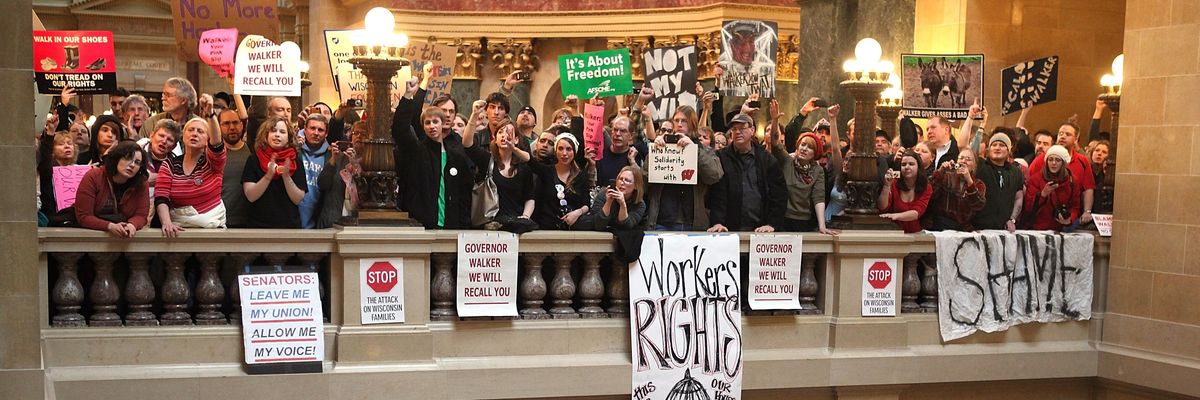"All Wisconsinites deserve the opportunity to live in a state that treats all workers with respect and dignity," one state representative said.

Protestors look up toward the Wisconsin assembly chamber on March 10, 2011 in Madison, Wisconsin during protests against restrictions on collective bargaining rights for public employees.
(Photo: Justin Sullivan/Getty Images)
Olivia Rosane
Dec 03, 2024
COMMON DREAMS
More than a decade after it sparked massive protests in the state capital, a Wisconsin judge on Monday struck down a controversial law that effectively ended public sector collective bargaining in the state.
In his final judgement, Dane County Circuit Judge Jacob Frost crossed out 85 sections of the 2011 law known as Act 10, which was championed by then-Republican Gov. Scott Walker. Frost's ruling restored the union rights of teachers, sanitation workers, nurses, and other public sector employees.
"After 14 years of battling for our collective bargaining rights, we are thrilled to take this step forward," Rocco DeMark, a building service worker and SEIU Wisconsin worksite leader, said in a statement. "This victory brings us immense joy. Our fight has been long, but we are excited to continue building a Wisconsin where we can all thrive."
"We realize there may still be a fight ahead of us in the courts, but make no mistake, we're ready to keep fighting until we all have a seat at the table again."
Act 10 severely weakened the power of public sector unions in Wisconsin by only permitting them to bargain for wage increases that did not surpass inflation. It also raised what public employees paid for healthcare and retirement, ended the automatic withdrawal of union dues, and required workers to recertify their union votes every year.
The law has had a major impact on the Wisconsin workforce. Between 2000 and 2022, no state saw a steeper decline in its proportion of unionized employees, a drop that the nonpartisan Wisconsin Policy Forum partly attributed to Law 10. Unions say that the law has caused a "crisis" for the state's education workforce, as 40% of new teachers leave within six years due to low pay and an unequal wage system. There is also a 32% vacancy rate for state correction officers.
Act 10 had one exception, however: Certain "public safety" employees such as police and firefighters were exempt from the collective bargaining restrictions imposed on "general" employees. It was this division that unions used to challenge the law in November 2023, arguing that it violated the equal protection clause of the Wisconsin Constitution. In July, Frost affirmed that the law was unconstitutional when he struck down an attempt to dismiss the suit. Then, on Monday, he specified exactly which parts of the law would be struck down.
"Judge Frost's ruling is a monumental victory for Wisconsin's working class," Democratic Wisconsin State Assembly Member Darrion Madison toldCourthouse News Service. "All Wisconsinites deserve the opportunity to live in a state that treats all workers with respect and dignity."
The lawsuit was brought by Ben Gruber, Matthew Ziebarth, the Abbotsford Education Association (WEAC/NEA), AFSCME Local 47, AFSCME Local 1215, Beaver Dam Education Association (WEAC/NEA), SEIU Wisconsin, Teaching Assistants Association (TAA/AFT) Local 3220, and Teamsters Local 695.
"Today's decision is personal for me and my coworkers," said Gruber, who serves as president of AFSCME Local 1215. "As a conservation warden, having full collective bargaining rights means we will again have a voice on the job to improve our workplace and make sure that Wisconsin is a safe place for everyone."
The news was also celebrated by state›wide advocacy groups and national leaders.
"We applaud today's ruling as a win for workers' rights and as proof that when we come together to ensure our courts and elected leaders are working on behalf of our rights and freedoms instead of partisan antics, we can accomplish great things," said A Better Wisconsin Together deputy director Mike Browne.
American Federation of Teachers president Randi Weingarten said: "This decision is a big deal. Act 10 stripped workers of the freedom and power to have a voice on the job to bargain wages, benefits, and working conditions. It's about the dignity of work. And when workers have a voice, they have a vehicle to improve the quality of the services they provide to students, patients, and communities."
"Former Gov. Scott Walker tried to eliminate all of that, and it hurt Wisconsin," she continued. "Now, many years later, the courts have found his actions unconstitutional."
Rep. Mark Pocan (D-Wis.) wrote on social media, "I voted against Act 10 more than 13 years ago, and am thrilled our public servants are able to once again organize and make their voices heard."
This is not the first time that Act 10 has been challenged in court, but it is the first time since the state's Supreme Court switched from a conservative to a liberal majority in 2023. Since Republican lawmakers have promised to appeal Frost's ruling, the law's ultimate fate could depend on elections in April 2025, which will determine whether the court maintains its liberal majority, according toThe Associated Press.
As they celebrated, the plaintiffs acknowledged the legal fight was not yet over.
"We realize there may still be a fight ahead of us in the courts, but make no mistake, we're ready to keep fighting until we all have a seat at the table again," Gruber said.
WEAC President Peggy Wirtz-Olsen said: "Today's news is a win and, while there will likely be more legal legwork coming, WEAC and our allies will not stop until free, fair, and full collective bargaining rights are restored."
Betsy Ramsdale, a union leader who teaches in the Beaver Dam Unified School District, said that public sector collective bargaining rights ultimately helped the state.
"We're confident that, in the end, the rghts of all Wisconsin public sector employees will be restored," she said. "Educators' working conditions are students' learning conditions, and everyone benefits when we have a say in the workplace."
No comments:
Post a Comment